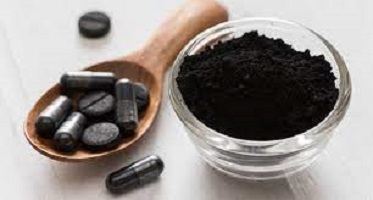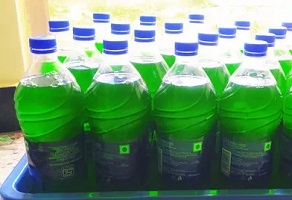Homemade Activated charcoal: How to make activated carbon
Homemade Activated charcoal: How to make activated carbon

- What Is Activated Charcoal, and How Does It Work?
- Activated charcoal benefits, uses, powder/tablet/pills/capsules/dosage, toothpaste, teeth & detox
- How to make activated charcoal at home in Nigeria
- Where to buy activated charcoal
- How to make homemade activated charcoal with lemon juice/salt for teeth whitening
- Homemade activated charcoal for water filter/plant/health
- Side effects
What Is Activated Charcoal, and How Does It Work?
Activated charcoal is a fine, odorless black powder that is commonly used to treat overdoses in emergency rooms.
Its toxin-absorbing qualities have a variety of medical and cosmetic applications, albeit none of them have been scientifically verified.
The black powder binds to poisons in the stomach, preventing them from being absorbed.
Because the body is unable to absorb charcoal, the toxins that bind to it are excreted in the feces.
Activated charcoal, also known as activated carbon, is a type of carbon that is manufactured from peat, coal, wood, coconut shells, or petroleum.
Charcoal is heated in the presence of a gas to produce activated charcoal. As a result of this process, charcoal develops a large number of internal gaps or pores.
Activated charcoal uses these pores to capture pollutants.
Why do people take activated charcoal?
People use activated charcoal for a variety of reasons:
- Homemade activated charcoal is used to treat poisoning and overdoses.
- Homemade activated charcoal, when combined with other treatments, may be beneficial in the treatment of acute poisoning.
- It’s also used for high cholesterol, hangovers, and upset stomach, although most of these claims aren’t backed up by scientific research.
Where can you find activated charcoal?
Activated charcoal can be found in toothpaste, skincare products, baked goods, beverages, and water filtration systems, to name a few examples.
What is the process for making homemade activated carbon? How to make activated carbon
- This unique sort of charcoal can be simply made at home using hardwood or charcoal.
- It provides a wide range of health and cosmetic benefits and applications.
- Homemade activated charcoal is widely utilized to remove toxins and poisons from the body when used for health.
- At home, activated carbon is used to filter polluted air, and it is also used as a toothpaste to whiten teeth.
- In the event of poisoning, it is a wonderful first aid item to have in our homes, especially if we have children.
- This is why understanding how to create activated carbon at home is quite beneficial.
- Activated charcoal, commonly known as activated carbon, is a porous form of charcoal.
The gaps within the charcoal have been expanded, allowing it to absorb more poisons or gases than regular charcoal.
Because it is “activated,” this form of charcoal looks similar to regular charcoal but has a higher absorption capacity.
Is taking activated carbon safe?
It is not only harmless, but it can also save people’s lives by preventing narcotic overdoses, gas poisoning, purifying the atmosphere, and removing contaminants.
How does it work? What is the mechanism behind it?
Homemade activated carbon can absorb a range of medications and chemicals in the stomach by binding them in its porous areas, negating the drug’s or toxin’s action.
Regular charcoal, on the other hand, has fewer pore spaces and hence can only absorb a few pollutants.
Because it is “activated,” this form of charcoal looks similar to regular charcoal but has a higher absorption capacity.
Homemade Activated charcoal uses – Homemade activated charcoal is used for a variety of purposes.
- It’s used to filter gas (that is, in making a gas mask to help filter toxic gases)
- It’s utilized as a room refresher because it eliminates odors from rooms, refrigerators, and other enclosed spaces.
- For teeth whitening – Whitens teeth
Charcoal aids in the removal of stains on the teeth that may have developed as a result of drinking coffee or eating greasy foods.
It whitens teeth by adsorbing plaque and tiny particles from between the teeth. Use this product two to three times each week.
- To get rid of bad breath
- Take care of alcohol poisoning
Homemade activated charcoal, when eaten, can help to relieve stomach discomfort caused by alcohol’s acidity and may even help to prevent hangovers.
- Glowing skin
When applied to the skin over time, activated charcoal treats skin disorders like rashes.
- Face mask
- Exfoliating the dead cells and opening up the pores can be done using activated charcoal mixed with honey and water and applied to the face.
- Also used to clear clogged sweat pores, which can lead to acne (it is therefore used for treating acne).
- To alleviate bloating-related stomach discomfort.
- Anti-aging
Homemade activated charcoal assists major organs by helping the body flush out the poisons and chemicals that cause damage due to its cleansing function.
These pollutants cause the human system to age more quickly, yet the cleansing effect of activated charcoal detoxifies and slows down the aging process.
- It can be wrapped around an injured part using bandages to aid in wound healing.
How to make activated charcoal at home
To manufacture homemade activated charcoal, you’ll need to first make conventional homemade charcoal by burning hardwood or fibrous plant material in a low-oxygen environment.
Then, to activate the charcoal, add activating agents such as lemon juice or calcium chloride.
To produce charcoal at home, you can use coconut shells, hardwood, olive peat, or coal.
Making the charcoal
- Set up a safe location for burning your wood, then start putting together hardwoods or coconut shells in the amount of carbon you require.
- Make sure you have enough firewood to burn the coconut shells or hardwood.
- In a pot, put the wood or shells you wish to turn into charcoal.
- Pour in the kerosene and light the fire; make sure the lid is closed tightly enough that only a little amount of oxygen enters the pot.
- As it burns, builds a second fire under the pot, one to turn the wood in the pot to charcoal and the other (under the pot) to provide heat.
Your handmade charcoal is ready when all of the hardwoods have completely burned and turned dark, and there is no longer any smoke or gas emanating from the fire.
You can avoid all these procedures and start creating your activated carbon if you have charcoal already.
Always rinse the charcoal before using it to eliminate any dust, sand, or chemicals that may have accumulated on it.
Activating the charcoal
- Make sure the charcoal is completely dry before grinding it into small pieces or powder with a mortar and pestle. To accomplish the same result, you can use a strong blender
- Pour 300 milliliters of lemon juice into a jar or container. In 300 mL of water, dissolve 100 grams of calcium chloride (the container can get hot due to the reaction of water with the calcium chloride).
- Cover and set aside for 24 hours.
- Strain the charcoal after 24 hours and rinse it with water before spreading it out on a baking tray.
- Dry in the oven or using a dehydrator until totally dry. The heat, combined with the lemon juice, activates the charcoal.
- Allow to cool after removing from the oven or dehydrator, then mix into desired sizes. Blend it into fine-activated charcoal powder to use as a face mask, to cure poisoning, or as a toothpaste.
What is the best way to store or preserve homemade activated charcoal?
Because it can absorb gases from the environment if left open, you can store it in an airtight container to prevent air from getting to it.
This will limit the strength and efficiency of your activated charcoal.
How to use activated charcoal
For the facial masque, you can use it as a powder or form a paste with it. It can be formed into a paste (like toothpaste) and used to whiten teeth by brushing with it.
Homemade Activated charcoal can be placed in a small bag and kept in a location where an unpleasant odor is present. Activated charcoal has a wide range of applications.
Side effects
Constipation is one of the negative effects of activated charcoal; additional side effects include a slowing of the intestinal tract, which can lead to obstructions. It may also cause dehydration.
Can you get activated charcoal naturally from foods?
Activated charcoal is a man-made substance. It isn’t found naturally in foods.
How does it work? Are there safety concerns?
When used orally, activated charcoal is probably safe for short-term use. Long-term use of activated charcoal may be safe. Constipation and dark stools are two common adverse effects.
When applied to the skin, activated charcoal is probably harmless for the majority of adults.
Special warnings and precautions
When taken for a short time while pregnant or breastfeeding, activated charcoal may be considered safe. Before you start using it, talk to your doctor.
Blockage of the gastrointestinal tract (GI tract) or delayed flow of food through the intestine: If you have an intestinal blockage, don’t use activated charcoal.
Also, see a healthcare expert before using activated charcoal if you have a condition that slows the passage of food through the intestine.
What is the dosage?
Activated charcoal is increasingly being utilized as a black food color in foods.
Activated charcoal has traditionally been used as medicine in a single dose of 100 grams taken by mouth under the guidance of a healthcare expert. It’s also found in wound care products.
Consult a healthcare professional to determine the optimal product and dosage for a specific problem.
Where To Buy Activated Charcoal in Lagos, Nigeria
Jumia Nigeria offers the best online prices on Activated Charcoal Powder. Jumia has Activated Charcoal Powder Offers with Best Deals – Fast Delivery


